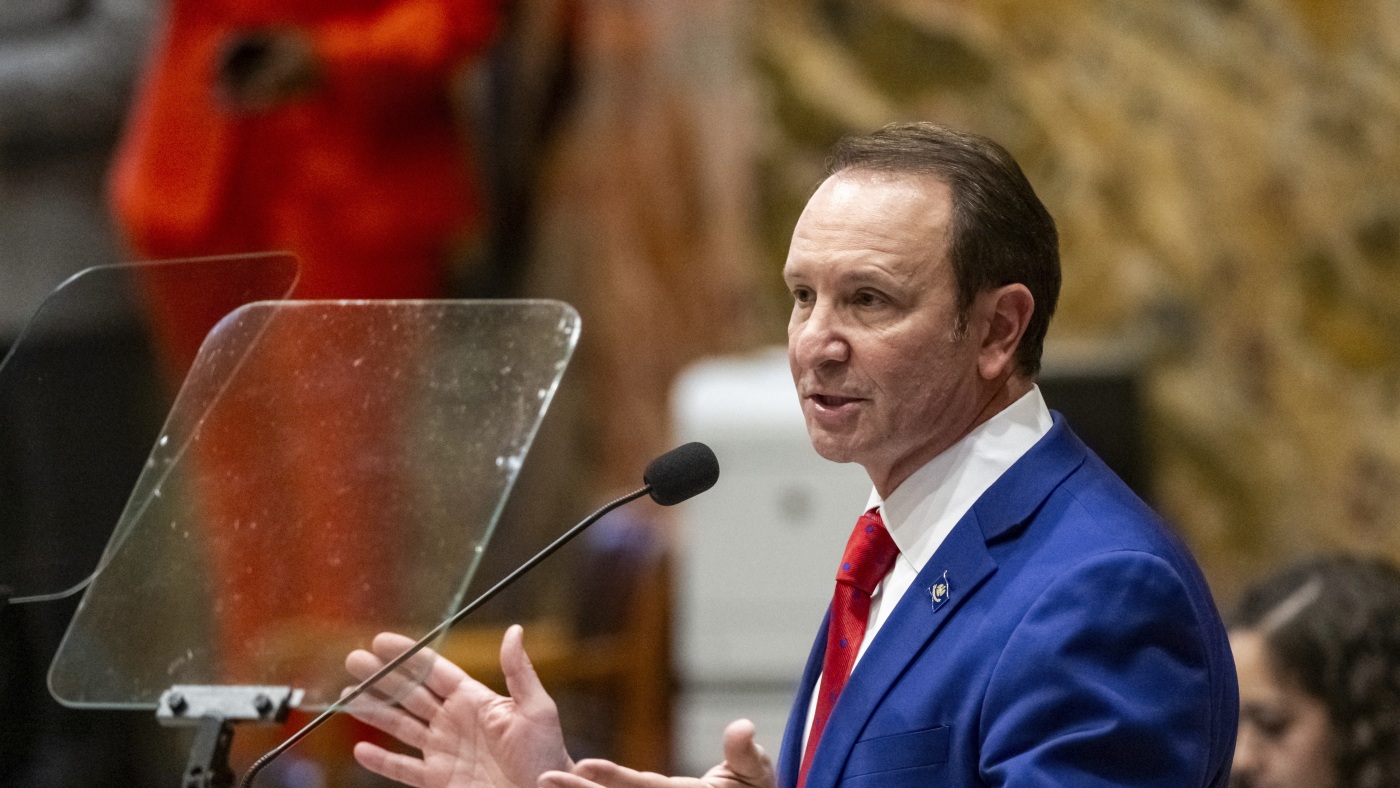Utah
Heat contributes to discomfort, illness and hopelessness among Salt Lake’s homeless population

Estimated read time: 4-5
minutes
SALT LAKE CITY — The small clusters of tents or makeshift shelters strung together with tarps fluttered at the sound of footsteps. The sweltering heat had already arrived by mid-morning with no wind in the forecast — the movement could only mean that someone was inside.
“Folks don’t have access to enough water, and so they get dehydrated pretty easily, and that leaves them very vulnerable to heat stroke,” said Wendy Garvin as she began to hand out plastic bags of ice and bundles of water to people emerging from their tents.
Garvin, executive director of Unsheltered Utah, and other community members have been delivering supplies to various encampments amid extreme temperatures over the past week. On a single day, Garvin reported handing out approximately 488 bottles of water. She also reported several cases of heat stroke and hospitalizations of unsheltered people due to the heat.
The heat wave swept into Utah early last week, bringing with it record-high triple-digit temperatures. The National Weather Service issued excessive heat warnings and heat advisories all across the state, and overnight temperatures stayed warm with the lows falling only to between 70 to 80 degrees.
Experts advised Utahns to take precautions to avoid heat-related illnesses by avoiding physical exertion during the hottest part of the day and staying indoors from 3-5 p.m. While the precautions may seem excessive to some, heat can be extremely deadly.
Heat-related deaths are one of the deadliest weather-related health outcomes in the United States, according to the Centers for Disease Control and Prevention. Around the country, heat contributes to some 1,500 deaths annually and homeless advocates estimate about half of those people are homeless.
Salt Lake City’s homeless resource centers saw a 98.7% occupancy rate in mid-July, with fewer beds since the temporary winter overflow ended in April. The deadly heat and limited options for the unsheltered population to escape it has mobilized efforts by community members like Garvin.
“People are in enclosed tents, which gather the heat and increase that heat. What we see is although the temperatures are reading at about 100 to 103 degrees in the shade, they’re running closer to 120 degrees out in the sun,” Garvin said. “And so, even people who have vehicles often can’t afford to keep them running to run their AC, and then the heat radiates into the metal cars and causes them to just become ovens. We just see a lot of really tough environmental challenges that are in some ways harder to fight than when it’s cold in the snow.”
In addition to water and ice, Garvin and volunteers have begun passing out flyers indicating where Salt Lake County cooling zones are located. The cool zones are designated areas any individual should be able to access during the day for shelter from the heat through Oct. 15.
Residents can easily locate their nearest cool zone facility by calling 385-468-3200 or by using an interactive map created by Salt Lake County. While the cool zone can provide temporary relief and is a needed program, there can still be gaps, Garvin said. The senior centers feature activities for everyone to participate in, but sitting in lobbies for hours on end can lead to restlessness or boredom. Conflicts between pets such as cats and dogs can also push people out of the programs, she added.
“They are good programs. They are spread pretty far out, so sometimes people really hit kind of a dead zone in between the different programs and don’t have close access to anywhere to go,” said Garvin.
But many of the unsheltered population are unwilling to leave behind their belongings, and transporting them in the heat can be dangerous. Some opt to camp on the street with their belongings and endure the heat, sometimes finding shelter near underpasses or shaded areas. Although a sanctioned campground has been discussed, current city policy prohibits camping on the streets and encampments are subject to city cleanings or abatements.
“I try to make the best of being out here as I can, but it’s hard really. It’s hard to move forward. It’s hard to progress and take large steps in any direction because it always seems like we’re spending our time and energy into protecting our stuff and we’re not protecting it; it’s getting thrown away,” said Ryan Dustin Lee, who is currently unsheltered.
Lee pointed to a recent abatement where he had lost a tent he had purchased and medication. The medication would require several steps to refill if the pharmacy were to refill it at all.
“It gets pretty tough, not only physically but mentally and emotionally. I just find it hard to believe that in the country we’re in and the state that we’re in that people are left out here on the streets,” Lee continued, with tears in his eyes.
After aid efforts last week, Garvin learned of a recent suicide by an unsheltered person on 500 West. “I see it as a sign of extreme conditions causing hopelessness,” she wrote in a text message to KSL.com.
Photos
Most recent Utah homelessness stories
More stories you may be interested in

Utah
Garden within walls of Utah prison gives inmates unique chance to grow

SALT LAKE CITY — At the Utah State Correctional Facility, within the walls of confinement is a rare form of freedom…a vegetable garden.
“You name it, we have tomatoes, peppers, onion, garlic, kale. Kohlrabi, everything you see at the store plus more,” explained Todd Barszcz, the case manager for the prison’s program reentry program.
Cody Neilson, who is serving a life sentence, is one of the 32 prisoners who spends up to six hours a day tending to the plants growing within the walls.
“It’s freedom,” Neilson said. “When you’re here, you’re not in prison.”
The unique opportunity is part of the prison’s horticulture program that allows certain inmates to work while incarcerated.
“I will check them on our computer system, I’ll look to see when their last write-ups were,” Barszcz said. “You have to behave not only here, but back on your housing unit.”
The food grown is used in a different program for culinary arts at the prison, helping supply fresh produce.
“We grow specifically for them,” Barszcz explained. “So they’re not using prepackaged food and stuff like that. We’re able to provide them with fresh foods so they can get the most of the experience.”
To both those running the program and those participating, gardening is not only a privilege, it’s therapeutic.
“Coming out of max come to here I was diabetic, I was taking insulin, I was taking 11 meds a day,” Neilson said. “I don’t take nothing now.”
Inmates are paid a small amount for participating and can earn a certificate in the gardening industry but more importantly, it gives them a sense of purpose.
“It gives us something that we can give back to the public, you know, a little bit of, you know, we’re sorry, but I’m here, but let me try and do the best I can and make the best of our situation,” he said.
According to The Utah Department of Corrections, 96% of inmates at the prison are likely to be released at some point so experts say these “work and learn” opportunities are essential.
“When you start talking about doing rehabilitation and teaching and educating to reduce recidivism within the institution, so that when people are released, they are less likely to come back,” Barszcz said. “That’s kind of why I’m so proud is because this represents the potential of what we can do as a correctional facility.”
Utah
FOX 13 Investigates: Utah soldier discharged after domestic violence charges

SALT LAKE CITY — The Utah National Guard has discharged a soldier who has been convicted of domestic violence and related offenses and who was on recordings saying slurs and insults against presidents Obama and Biden, according to the man’s ex-wife and victim.
FOX 13 News has been reporting on the case of former Utah Army National Guard Sgt. 1st Class Christian Marx for more than 2 ½ years. In 2021, he was charged with assaulting his then-wife, Erica Lukes.
About three years after he was first charged with crimes, the Utah National Guard opted in February of this year to issue Marx a general discharge, according to Lukes, who said she was told such by her National Guard victim’s advocate. A Utah National Guard spokesman declined to confirm that to FOX 13.
It was a reversal for the National Guard. Spokesmen had previously said commanders were waiting on the civilian courts to adjudicate Marx’s charges.
“I definitely do question though, why [the discharge] has taken such a long time,” Lukes said in a recent interview with FOX 13.
A general discharge would allow Marx to keep his veteran’s benefits.
NEW COUNTS
Then in April, with other charges still pending, Marx was cited for domestic violence against a second woman, this time in Centerville. Days later, he was arrested again and charged with a felony for violation of a jail release order.
Marx would later tell a judge he went back to the woman’s apartment when she was not there to retrieve clothes, but the terms of his release for the previous domestic violence citation said he was to have no contact with the woman and to stay away from her residence.
Marx spent 34 days in the Davis County jail before he could secure his release. In May, he reached an agreement with prosecutors in Salt Lake City for the assaults against Lukes. Marx pleaded guilty to one misdemeanor count of domestic violence assault. A second count was dismissed.
The judge sentenced Marx to time served – even though those days he spent in jail were for a different victim.
Lukes said that’s not enough.
“I believe, without a doubt, my life is and will continue to be in danger as will be his latest victim,” Lukes told the judge at Marx’s sentencing hearing.
Marx assured the judge he would have no more contact with Lukes.
“If you do,” Third District Court Judge Barry Lawrence warned Marx, “and it comes back to me, then all bets are off and you’re going to spend a year in jail.”
Back in Davis County, on June 10, Marx reached another deal with prosecutors. The violation of the jail release agreement was reduced to a misdemeanor. Marx pleaded guilty.
Second District Judge Ronald Russell again gave Marx credit for the 34 days in jail – no additional incarceration. Marx must serve 18 months probation.
During the hearing, Marx apologized for violating the order and summarized his military service.
“I did two combat tours in Iraq; combat tour in Bagram,” he said.
“Thank you for your service,” Russell replied.
THREATS OF VIOLENCE
The Utah National Guard also declined a FOX 13 interview request to discuss its separation from Marx and public records requests seeking copies of its investigations into Marx.
Besides the criminal charges in civilian court, Lukes had supplied the national guard with recordings she made.
“That f___ing Sudanese ni____ and his f___ing white f___ing wigger tied our hands behind our backs,” Marx is heard on a recording Lukes made on Nov. 7, 2020, the same day the Associated Press called Joe Biden the winner of the U.S. presidential election. Marx was talking about his time as a soldier in Afghanistan.
“That f___ing needs to get f___ing executed,” Marx continued. “And his f___ing Biden f___ing bully — f___ing both of them f___ing ni_____.
“F___ing Biden. I f___ing hate his guts. If I ever see him, if I ever see him in person God forbid, God forbid, I am going to insult the president and beat the f___ out of him.”
Lukes made another recording on Nov. 13, 2020.
“I have no issues f___ing taking a gun and starting shooting,” Marx said, “start shooting left-wing mother f___ers at their rallies. No problem at all.”
According to documents, Meanwhile, Lawrence dismissed a felony gun possession charge against Marx. That count alleged Marx fired a pistol on the national guard range in 2021 after a protective order had been issued against him. Marx had pleaded not guilty.
The Salt Lake County District Attorney’s Office had said witnesses were on vacation or out of the country due to military deployments. Lawrence left open the chance for prosecutors to refile
the charge. Salt Lake County District Attorney Sim Gill told FOX 13 his office hasn’t yet determined if it will refile.
The dismissal was a blow to Lukes. She had hoped a felony conviction and a permanent loss of firearms rights that go with it would offer her additional protection.
“After the dismissal of the felony case,” Lukes said, “I literally couldn’t get out of bed for two weeks.”
“I feel more afraid for my life than I did back” when she was married to Marx, she said.
Through his attorney, Marx has declined interview with FOX 13.
Marx had pleaded not guilty to the domestic violence citation in Centerville Justice Court. That charge was dismissed Thursday but with a note saying – because he now has prior domestic violence convictions – the charge may be refiled in state court.
Utah
Durzi signs 4-year extension with Utah

By Eric Stephens, Chris Johnston and Pierre LeBrun
Having an aggressive first offseason following its relocation from Arizona as the Coyotes, Utah Hockey Club continued solidifying its defense corps by re-signing Sean Durzi to a four-year contract on Sunday.
The Athletic’s Chris Johnston reported Durzi’s extension coming in with an average value of $6 million. According to The Athletic’s Pierre LeBrun, the 25-year-old Durzi will make $7.1 million next season, $5.6 million in 2025-26, $4.8 million in 2026-27 and $6.5 million in 2027-28. A 10-team no-trade clause will be in effect in the third and fourth years.
“We’re thrilled to have Sean in Utah with the team for the next four years,” Utah HC general manager Bill Armstrong said. “Sean is a reliable two-way defenseman who can anchor the power-play and provide offense from the blue line. He’s a young, highly skilled defenseman with an incredibly bright future, and we look forward to having him as a core player for this organization.”
DURZI RETURNS ✍️🩵
We have signed Sean Durzi to a four-year contract!#UtahHC pic.twitter.com/rXBdB0szg6
— Utah Hockey Club (@utahhockeyclub) June 30, 2024
Durzi led all Coyotes defensemen with nine goals, 32 assists and 41 points. Traded by the Los Angeles Kings last summer for a second-round pick in this year’s draft, the 2018 second-round choice by the Toronto Maple Leafs flourished in a top-four, big-minute role with the Coyotes after playing further down in the Kings’ defense lineup.
“I think I have much more to reach,” Durzi told The Athletic last October. “That’s always been my way of going about it. You always feel as if you can give more and I think that’s really, really important for myself. My ceiling is — I don’t know yet. I believe there’s so much more I can get better at. I’ve already learned so much more this year than I even thought I could learn. And that’s always how it is, what you do day in, day out. Can I get better in these areas?
“And that’s my goal. My goal is to be the complete player. A guy you can depend on whether you need a goal with a minute-30 left or whether you need one off the board with a minute-30 left. A guy who’s going to be able to fight for his teammates and put his heart on the line for the team every single night.”
Utah has been active at the start of Ryan Smith’s ownership of the club. Without any of its defensemen signed following the 2023-24 season, Utah and its loads of salary-cap space have reshaped the blue line by trading for Mikhail Sergachev (with J.J. Moser heading to Tampa Bay) and John Marino while bringing back Michael Kesselring and Juuso Välimäki on new contracts.
In re-signing Durzi to a major deal, Utah could enter next season with its new No. 1 defenseman in Sergachev and the right-shot Durzi as his likely partner on the top pair. Utah, which has been making a splash under Smith, still has what CapFriendly estimates is another $22 million available under the cap as free agency begins Monday.
GO DEEPER
Is Utah Hockey Club playoff-bound after adding Mikhail Sergachev and John Marino?
(Photo: Christian Petersen / Getty Images)
-

 News1 week ago
News1 week agoTracking a Single Day at the National Domestic Violence Hotline
-

 News1 week ago
News1 week agoA Florida family is suing NASA after a piece of space debris crashed through their home
-

 World1 week ago
World1 week agoIsrael accepts bilateral meeting with EU, but with conditions
-

 Politics1 week ago
Politics1 week agoSupreme Court upholds federal gun ban for those under domestic violence restraining orders
-

 World1 week ago
World1 week agoIsrael will be the ‘ultimate loser’ in war with Hezbollah, Iran says
-

 World1 week ago
World1 week agoNew Caledonia independence activists sent to France for detention
-

 News1 week ago
News1 week agoArkansas police confirm 4th victim died in grocery store shooting
-

 Politics1 week ago
Politics1 week agoDeSantis signs bill allowing residents to kill bears, vetoes bill that fines slow left lane drivers

















